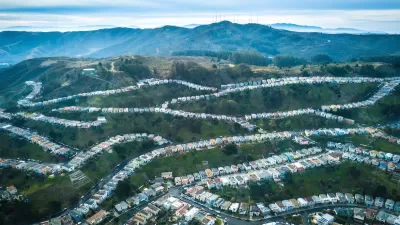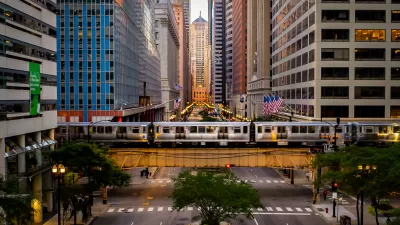My sense is that most new urbanists and smart growth advocates were happy to see Barack Obama elected President two years ago. While John McCain opposed Amtrak and had not been overly supportive of local public transit, Obama created an Administration full of advocates for transit and urbanism, and high-speed rail is one of his Administration's signature programs. So the Obama Administration will slow sprawl, and will make our cities more transit-oriented, prosperous and walkable. Right?
My sense is that most new urbanists and smart growth advocates were happy to see Barack Obama elected President two years ago. While John McCain opposed Amtrak and had not been overly supportive of local public transit, Obama created an Administration full of advocates for transit and urbanism, and high-speed rail is one of his Administration's signature programs. So the Obama Administration will slow sprawl, and will make our cities more transit-oriented, prosperous and walkable. Right?
Not so fast. Since President Obama took office, public transit service has been slashed almost everywhere; the Obama Administration apparently was unable to foresee how deep the recession would be, and its stimulus efforts were too small to forestall local governments' jihad against public transit. And because the Obama Administration was too busy remaking the health insurance industry to get a highway/transit bill passed in 2010, it essentially punted the issue to the more conservative Congress taking office this year.
To make matters worse, President Obama's failure to jump-start the economy led to a right-wing backlash, causing the election of a Congress eager to cut spending on just about everything but Social Security and Medicare. Given the House's newfound embrace of austerity, the federal government might not even continue transit funding at current levels, let alone increase funding.
Admittedly, President Obama can still fight the Republican House with a Democratic Senate and veto power. But his new budget will include cuts in even noncontroversial government programs such as home heating assistance for the poor- an indication that the President plans to run for reelection as Republican Lite, rather than continuing his pre-2010 pattern of supporting expanded government services.
To be fair, President Obama has started some new programs designed to further walkable urban development. But these programs are likely to be significantly reduced by the Republican House or are too small to be particularly significant. For example, in 2010 the government made $168 million in "sustainable communities grants" to state and local planning agencies, and was authorized to make $600 million in grants under the TIGER (Transportation Investment Generating Economic Recovery) program, But this number is puny compared to the $10 billion per year that the federal government spends on the Federal Transit Administration - which means that even a small cutback in FTA funding will dwarf whatever good is done by TIGER and the sustainable communities grants. In short, it is quite possible that public transit will get less support over the next few years than under the Bush Administration.
Would government have been more generous under McCain? Possibly so. On the one hand, urban development and public transit would receive little positive White House attention. But since the public tends to react against the party holding the White House when unemployment is high, the Democrats would have gained seats in the 2010 midterms, possibly having as much as a 2-1 edge in one or both Houses of Congress. Such a left-leaning Congress would have been unlikely to support budgetary austerity- good news for transportation advocates. And on budgetary matters, Congress tends to get its way, since Presidents typically have limited appetite for budgetary shutdowns and trench warfare with Congress.
I cannot say whether John McCain would have been a better President overall than Barack Obama - but I strongly suspect that quite inadvertently, he would have been a better President for mayors and transit riders.

Depopulation Patterns Get Weird
A recent ranking of “declining” cities heavily features some of the most expensive cities in the country — including New York City and a half-dozen in the San Francisco Bay Area.

California Exodus: Population Drops Below 39 Million
Never mind the 40 million that demographers predicted the Golden State would reach by 2018. The state's population dipped below 39 million to 38.965 million last July, according to Census data released in March, the lowest since 2015.

Chicago to Turn High-Rise Offices into Housing
Four commercial buildings in the Chicago Loop have been approved for redevelopment into housing in a bid to revitalize the city’s downtown post-pandemic.

How Financing Restricts the Rental Housing Market
The way apartment buildings are financed has a major impact on supply and costs.

Houston Mayor Pauses Complete Streets Projects
The move raises concerns among road safety advocates who point out that traffic deaths continue to rise.

Twin Cities Trains Move to Fewer Cars, Higher Frequency
Headways will drop from 15 minutes to 12 minutes.
Licking County
Barrett Planning Group LLC
City of Cleburne
HUD's Office of Policy Development and Research
Mpact Transit + Community
HUD's Office of Policy Development and Research
City of Universal City TX
ULI Northwest Arkansas
City of Laramie, Wyoming
Write for Planetizen
Urban Design for Planners 1: Software Tools
This six-course series explores essential urban design concepts using open source software and equips planners with the tools they need to participate fully in the urban design process.
Planning for Universal Design
Learn the tools for implementing Universal Design in planning regulations.




















